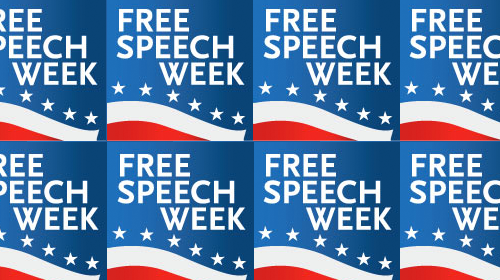
In honor of Free Speech Week, let's take a moment to acknowledge the obvious. Free speech is incredibly, almost unbelievably important, especially in a democracy.
It can also be unpleasant, uncomfortable and even downright offensive. Which can make defending it rather awkward at times.
Let's take a trip back to Boston during this week in 1923:
Beantown's Democratic machine boss and chief executive is the flamboyant Mayor James Michael Curley, a felon, rake, and hometown hero. As the Boston Globe put it, he "served four terms as mayor, four terms in Congress, one term as governor, and two terms in jail."
Another popular political force in those days was the Ku Klux Klan. At its height in the 1920s, it effectively ran several states and would stage rallies seeking support in the rapidly urbanizing northern cities, including Boston, where racial and religious tensions were taut.
Mayor Curley—a hero among the city's Irish-American working class—saw a campaign issue. On October 23, 1923, while calling himself a "stout stickler for freedom of meeting, speech and press," he banned peaceful Klan meetings in Boston. In response to a letter from the local ACLU condemning the KKK but strongly defending the group's right to speak and gather, Curley said, "The Klan cannot expect to shelter itself behind the rights it denies and the guaranties it repudiates."
The argument has some appeal. Why should we tolerate intolerance, especially by a group as objectionable as the Klan? Consider, however, another move against unpopular speech by the good mayor. In 1925, Mayor Curley banned Margaret Sanger—the birth control activist and founder of Planned Parenthood—from speaking in Boston. In doing so, he lashed out against the ACLU and explicitly linked the Sanger ban to his moves against the KKK.
Having banned the Klan, silencing Sanger was just another step down that road. When you put some lawful speech outside the protection of the First Amendment because it is unpopular or even offensive, speech you like will invariably be lumped in as well. The KKK of the 1920s was a horrific thing. But Mayor Curley proved that progressive social reformers could be painted as equally horrific and their speech just as deserving of suppression.
Fortunately, despite the efforts of Curley and many like him, free speech protections grew muscle in the decades to follow. And support for contraception and similar social reforms started to win in the marketplace of ideas, while the Klan ate dust in the bin of history.
The ACLU continues to support free speech for all precisely because of these historical experiences. We understand that our position will allow some speech that is not just unpopular, but possibly deplorable. But our defense of speech regardless of speaker comes down to a simple truth: once you give the government the ability to silence unpopular speech, no one is safe. Once you start playing favorites with the protections of the First Amendment, you put yourself at the mercy of shifting political whims.
Free speech only for some translates directly into free speech for none.
To read more and join in the celebration of Free Speech Week, please visit http://www.freespeechweek.org.
For more on free speech history, check out Professor Sam Walker's Today in Civil Liberties History.
Learn more about free speech and other civil liberties issues: Sign up for breaking news alerts, follow us on Twitter, and like us on Facebook.
